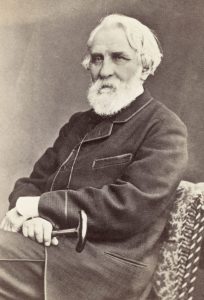‘Rudin’ by Ivan Turgenev: “Poetry is the language of the gods”
Because it was a great pleasure for me to discover the classical literary universe of Turgenev through “Home Of The Gentry” and because, in the same volume, there was another well-known novel, I continued my journey with “Rudin”.
About the author 
I have talked before about this well-known classic of Russian literature, I will now bring to light a short biography of Ivan Sergeyevich Turgenev.
He was born in Oriol on October 28, 1818, into a noble family. He graduated University of Saint Petersburg in 1836, focusing on Classics, Russian literature, and philology. Between 1838 and 1841 he studied at the University of Berlin. He writes verses and makes his debut, in 1838, in the Sovremennik (Contemporary) magazine. After the appearance of the poem “Parasha”, in 1843, he is considered a hope of the new generation. The first attempts in prose (“Andrei Kolosov”, “Three portraits”) show the influence of Gogol and Lermontov. First published in Nekrasov’s Contemporary, “A Hunter’s Sketches”, which appeared in his debut volume in 1852, enjoyed enormous success. He is sentenced to house arrest after the obituary written on Gogol’s death. Since 1856, he lives more abroad, in Germany, then in Paris. He became known in French literary circles, becoming friends with Flaubert, Zola, Maupassant. He dies, after a painful illness, at Bougival, near Paris, on September 3, 1883. The novels “Rudin”, “Home Of The Gentry”, “On The Eve”, “Fathers And Sons” brought him worldwide fame.
About the book 
Rudin is the main character of the novel that bears his name, an effervescent, captivating character who masters the art of oratory, thus subjugating his audience. The intellect and eloquence of the young man conquer Mrs. Darya Mikhailovna, who belongs to the nobility and who will host him for a while to enjoy his delightful company. Moreover, lacking financial means of his own , Rudin had made a lifestyle out of visiting various nobles willing to listen to him or put his ideas and beliefs into practice. Rudin feeds off the fascination he causes others.
The plot of the novel is Rudin’s closeness to Natalya, the 17-year-old daughter of Darya Mikhailovna. This connection will cause despair for Volyntsev, a retired cavalry officer, a suitor who patiently and persistently waited for his deep but discreet feelings to be reciprocated. Volyntsev’s poised and reserved attitude will be overshadowed by Rudin’s explosive temper. But will Rudin know how to respond to the feelings he awakens in the young girl or will his words, although masterful, prove to be devoid of content, as accused by a former friend from the student period, who is also a witness to the events?
Turgenev once again proves his ability to analyze human emotions, to bring before the reader different types of characters, without neglecting the stylistics used. Descriptions of the surrounding nature foreshadow, in carefully chosen metaphors, the scenes to unfold.
Imperceptibly, the author teleports his reader alongside the characters, in a corner of the room where nothing spectacular seems to be happening: there is philosophical conversation regarding modern Russian society, some play cards, some play the piano, others sew on the loom or drink tea etc. No matter what, the reader is there, watching the play right from the stage.
The novel is about love, under several aspects of it (because there is more than a love plot), friendship, perseverance, interpersonal connections, social customs of those times and it surprises with a morally charged ending.
To the author
Читая роман, я испытывал смешанные чувства к Рудину, но сильная концовка прояснила эти чувства. Спасибо за урок!
(Reading the novel, I had mixed feelings for Rudin, but the powerful ending made these feelings clear. Thank you for the lesson! – Google translation, Russian language)
Quotes
- “Poetry is the language of the gods. I love poems myself. But poetry is not only in poems; it is diffused everywhere, it is around us. Look at those trees, that sky on all sides there is the breath of beauty, and of life, and where there is life and beauty, there is poetry also.”
- “Nothing is worse and more hurtful than a happiness that comes too late. It can give no pleasure, yet it deprives you of that most precious of rights – the right to swear and curse at your fate!”
- “There are none so easily carried away as those who are without passion.”
#LustForFlying #booklover #bookstagrammer #rudin # turghenev #edituraHumanitas #HumanitasFiction #classics #russianliterature
- Advertisement -

